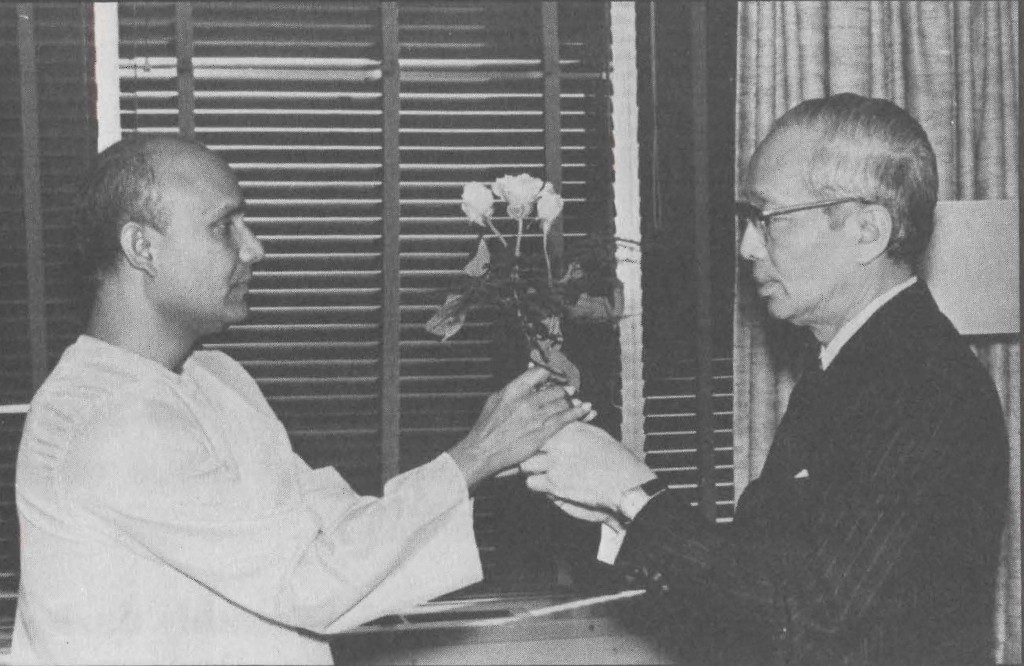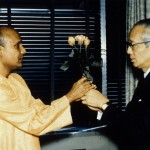U Thant Peace Award 1991 (c) Professor de Marco previous statements
Filed under U Thant Peace AwardMain post is: U Thant Peace Award, 28 September 1991 – Overview
This contains further Details:
Including recitations at programe of excerpted statements of Professor de Marco.
The cooperation of mind and heart towards an integral life of Oneness
In the present day it is becoming ever more clear that a brilliant mind lacking the guidance of a luminous heart may prove to be a dangerous weapon rather than a constructive tool. On the road to peace, great minds may clash, but when governed by good, wise and magnanimous hearts, they can work tirelessly together in the spirit of oneness.
Many in the General Assembly have commented on Professor de Marco’s wisdom, and we feel here, once again, his magnanimous heart.
In the words of U Thant, “Pure intellectual development unaccompanied by a corresponding moral and spiritual development will lead mankind from one crisis to another. Moral qualities of friendship, humility and the desire to understand the other point of view are as important as intellectual excellence.”
U Thant was, himself, an Ideal exponent of this integral life. He made time every day for silent contemplation in the midst of his pressing duties as Secretary-General. His example continues to remind us that an awakened Inner life Is possible, practical and, Indeed, essential for the peace-builders of today.
It is thus extremely fitting that we invoke his name today in honouring Professor Guido de Marco, who once again proves that a truly practical and effective life dedicated to world-transformation derives boundless power and Inspiration from the luminous spiritual heart.
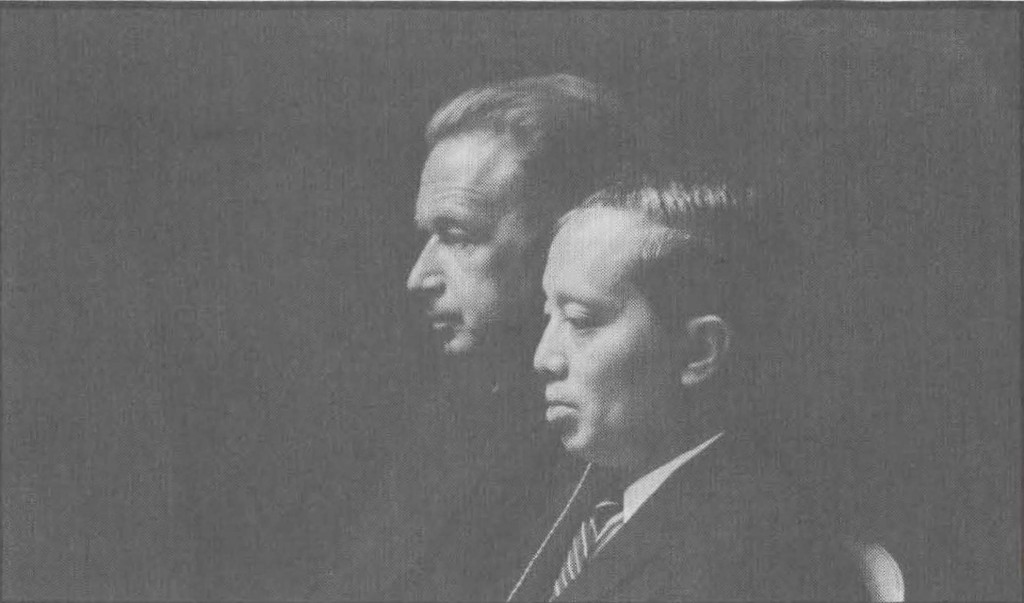 Former Secretary-General Dag Hammarskjöld and U Thant.
Former Secretary-General Dag Hammarskjöld and U Thant.
About War:
In Sri Chinmoy’s recent publication War: Man ‘s Abysmal Abyss·Plunge he writes: “War Is the utter disgrace-failure of hostile minds.”
In his speech to the General Assembly during the general debate on 26 September 1991 , Professor de Marco said, “Taking up arms Is In one respect also a sign of failure-the failure to find alternative, non-violent means of solving our differences.”
( Some other relevant Quotations by Honoree:)
We would like to quote several particularly inspiring and eloquent excerpts from Professor de Marco’s recent remarks to the General Assembly which demonstrate the breadth of his vision and the depth of his wisdom.
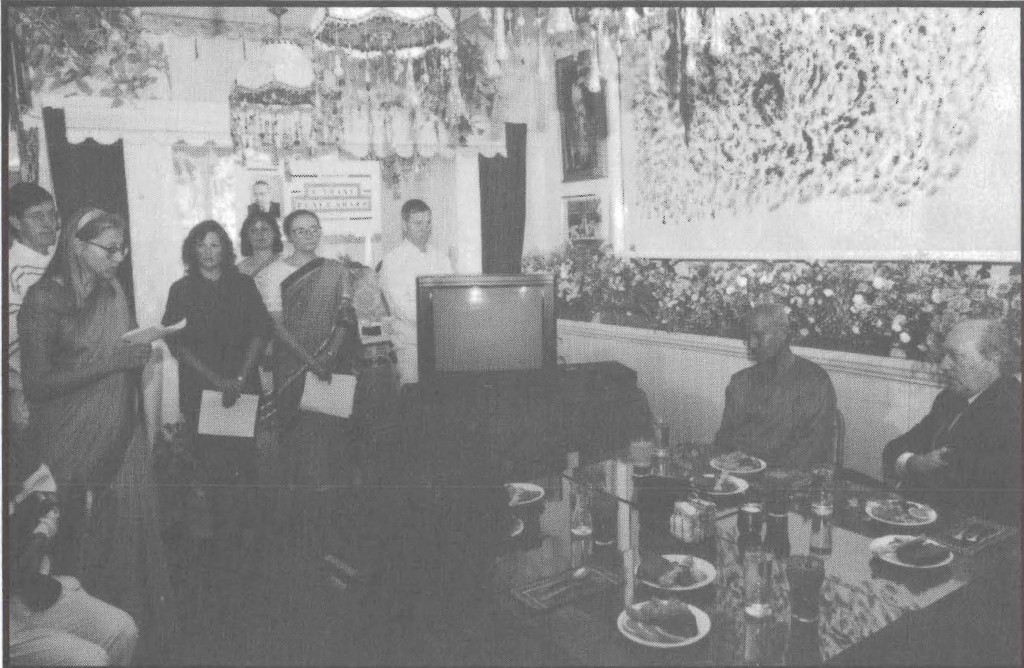 Members of the Peace Meditation read excerpts from Dr. de Marco’s recent speeches.
Members of the Peace Meditation read excerpts from Dr. de Marco’s recent speeches.
Professor de Marco unites the idealism of the past with the realism of the present:
“I believe in a second-generation United Nations, a United Nations rooted in the principles and aspirations which went into its foundation 45 years ago, but taking nourishment from the breath-taking developments in international relations that have been occurring in recent years and have gathered even greater momentum over the last few months.”
And again, in a different context:
“Great sensitivity to the past and realism today are fundamental in reaching solutions which are to be based on the unacceptability of the use of force and the need to take account of all legitimate concerns and aspirations.”
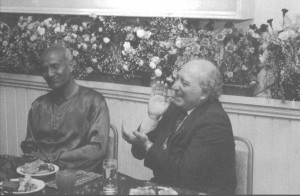 Professor de Marco outlines a bold and visionary new sphere of responsibility for the Trusteeship Council:
Professor de Marco outlines a bold and visionary new sphere of responsibility for the Trusteeship Council:
“May we suggest that in addition to the its role under the Charter, the Trusteeship Council should hold in trust for humanity – humanity’s common heritage and its common concerns: the environment; the protection of extraterritorial zones and the resources of the sea and of seabed. The climate and the rights of future generations.”
Professor de Marco vividly echoes U Thant’s stirring words about the parallel development of mind and spirit:
“ Though we may have moved away, in our efforts at economic development of the Third World countries, from the ‘dismal science’ mentality by introducing the ‘human face’ dimension, may we perhaps add to this notion the notion of a face which is both human and honest?”
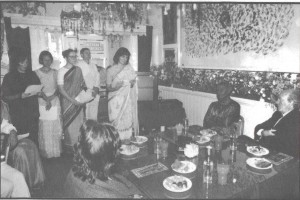 Professor de Marco’s words convey the force of truth and the power of poetry:
Professor de Marco’s words convey the force of truth and the power of poetry:
“the peace that we are striving for, and for which millions have died, is peace in freedom. This is our commitment to the United Nations. This is our shared privilege. This is our common responsibility.”
In reflecting on his far-reaching experiences during the past year, Professor de Marco emphasises the supreme importance of individual commitment:
“I experienced another dimension of the personal dedication and commitment which the United Nations has such tremendous capacity to generate: the unknown heroes of today, young men and women—including many from diverse non-governmental organizatlons – who are dedicating the best years of their lives to the service of those, who for many, may appear to be forgotten by humanity.”
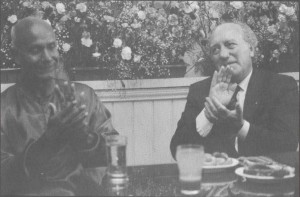 Malta is a country tiny in size but vast in scope and vision. Thus, it seems that Professor de Marco was nurtured by a land of world-uniting concern. In his words:
Malta is a country tiny in size but vast in scope and vision. Thus, it seems that Professor de Marco was nurtured by a land of world-uniting concern. In his words:
“Malta’s foreign policy is to project to other nations its true identity by strengthening confidence and respect for the political norms of a pluralistic society and of a democratic environment where mutual respect and equal rights for all are encouraged and upheld.”
Award presentation
Mr. Adhiratha Keefe: Professor de Marco, to us, your friends and admirers of the Peace Meditation Group at the United Nations, and to Sri Chinmoy’s students and friends around the world, you embody and express the ideals which we hold dear and seek to symbolise with our U Thant Peace Award. In and through you, your geographically small but spiritually powerful nation exerts a soulfully commanding influence on the course of world events. You have set forth imaginatively, brilliantly and clearly the diverse mechanisms needed to meet the challenges of the new world order.
You have reminded us of the crucial link between human rights and peace. You have shown that the human dimension must he the essence of our solution to the great global problems of today, and that the face we show to the world must he not only human hut also honest. Richly endowed with Malta’s heritage of far-reaching education and diplomacy, you take the concerns of your nation and the concerns of the world as your very own, illumining them with your knowledge, wisdom and compassion.
Like you, we In the Peace Meditation Group firmly believe that the dedicated commitment of one individual, one group, one society or one nation can and will inspire and energise the world toward the establishment of a fruitful and lasting peace.
* * * * * * * * * * * * * * * * * * * * * * *
For Complete award ceremony see also:
U Thant Peace Award 1991 (a) Sept 28 – Overview
and more details:
U Thant Peace Award 1991 (b) Professor de Marco’s life and contributions
U Thant Peace Award 1991 (c) Professor de Marco previous statements
U Thant Peace Award 1991 (d) Background – Previous Recipients
U Thant Peace Award 1991 (e) Songs: Mr. de Marco, Malta and Recipients quotations
U Thant Peace Award 1991 (f) Response Mr. de Marco – Recipient
U Thant Peace Award 1991 (g) Informal Remarks
U Thant Peace Award 1991 (h) Media Coverage: Malta & USA
- 1970s-u-thant-ckg-meet-at-un-flowers-colo
